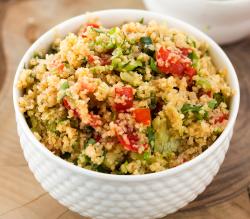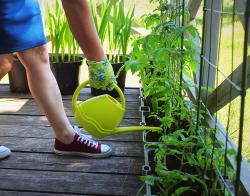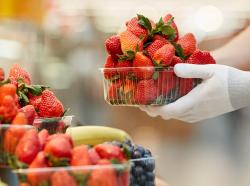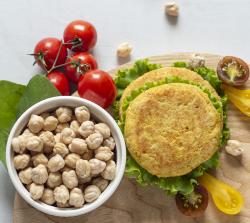Staying Healthy – Plant-Based Protein Substitutes
Recipes and Nutrition Tips – Enjoy the Benefits of Locally Grown Foods
Physical Activity Tips – Sustainable Transportation
Gardening Tips – Environmental Benefits of a Garden
Food Access Resources in Massachusetts – Using HIP Benefits
STAYING HEALTHY
Eating plant-based protein foods is sustainable and beneficial to our planet because they need fewer resources for growing and processing than animal protein sources. They provide our bodies with protein, vitamins, minerals, and fiber. Check out these ideas for ways to eat more plant protein in all your meals and snacks and help your body grow, build, and maintain muscle.
- Legumes: add cooked beans, or peas to soups, or a bean burger or mix into rice.
- Soy: snack on edamame beans, add tempeh or firm tofu to a stir-fry or add silken tofu to a smoothie.
- Seeds: sprinkle chia, pumpkin, hemp, or sunflower seeds on whole-grain cereal, low-fat yogurt, or a salad.
- Nuts: have nuts for a snack, add chopped cashews on top of soup, or spread nut butters on toast or crackers.
- Plant-based products: add seitan into pasta, jackfruit into tacos, miso into dressings, tahini into sauces, and nutritional yeast on top of salads or popcorn.
RECIPES AND NUTRITION TIPS
 Taste the flavors of locally grown foods.
Taste the flavors of locally grown foods.
Our Veggie Bulgur recipe will be a hit at any summer event. It is a tasty recipe and good for the environment! Whole grains such as bulgur, brown rice, and quinoa use less water to grow and produce more food with less waste than non-plant-based foods. You can substitute the vegetables in this recipe with any local produce. Locally grown food is full of flavor, benefits the local economy, and tends to have more nutrients because of the shorter travel time it took to get to your plate.
Do you have extra bulgur in the pantry? Try the University of Illinois Extension’s Bulgur Tabbouleh recipe at https://fb.watch/5IX2yjBFqj/.
PHYSICAL ACTIVITY TIPS
 Make transportation sustainable.
Make transportation sustainable.
We all rely on some form of transportation to get from here to there. All modes of transportation require energy, but some forms of energy are friendlier to the planet than others. Everyone benefits from sustainable transportation because we are keeping the air cleaner, and if we are more physically active, it is healthier for our bodies, too!
Here are some sustainable transportation ideas:
- Ride a bike, a scooter, or walk instead of using your car.
- Are you in the market for an automobile? Consider electric or hybrid options.
- Take public transportation when possible.
- Carpool to work with your spouse or a coworker.
GARDENING TIPS
 Gardening is great for the planet and for our bodies.
Gardening is great for the planet and for our bodies.
A garden creates a pleasant atmosphere that will boost your mood. Gardening is good for our health because being outside exposes our bodies to vitamin D. And as a hobby, gardening can continue as we age. All gardens, no matter how big or small, benefit the planet! Growing a variety of plants encourages wildlife, purifies the air, minimizes heat waves, and feeds the bees and other pollinators. Start making a difference with a small garden. If you live in an apartment or in the city, create a potted garden on your balcony, on your patio, or along the sidewalk to help create oxygen and provide habitat and food for helpful insects. Visit https://www.nal.usda.gov/topics/home-gardening for more information about home gardening.
FOOD ACCESS RESOURCES IN MASSACHUSETTS
 You can earn SNAP dollars with the Massachusetts Healthy Incentives Program (HIP).
You can earn SNAP dollars with the Massachusetts Healthy Incentives Program (HIP).
Spend your SNAP dollars on farm-fresh fruits and vegetables at participating HIP farmstands and farmers’ market retailers and have the amount of your purchase instantly added back to your EBT card. To locate markets near you, visit this interactive map at https://dtafinder.dtadash.ehs.mass.gov/hip/.
Project Bread – Learn about food assistance resources available to Massachusetts residents. Visit https://www.projectbread.org or call Project Bread's Food Source Hotline at 1-800-645-8333. This number is toll-free and confidential. Hotline hours: Monday–Friday, 8 am to 7 pm; Saturday, 10 am to 2 pm.
